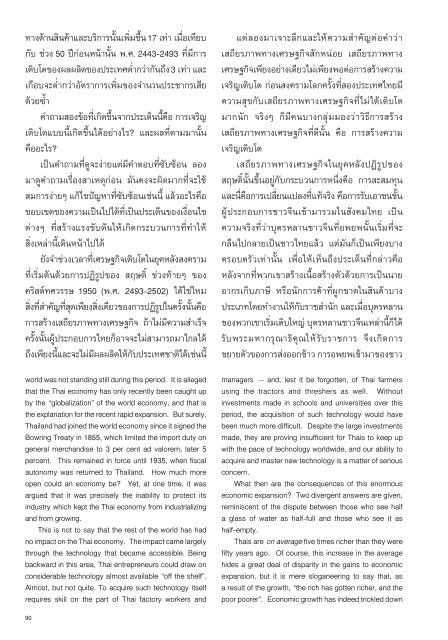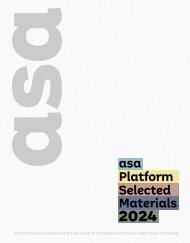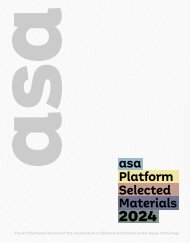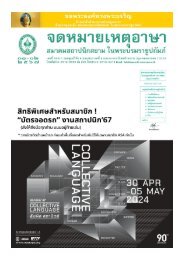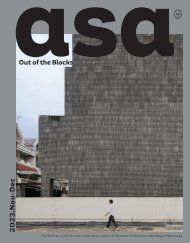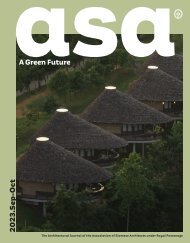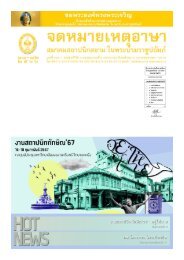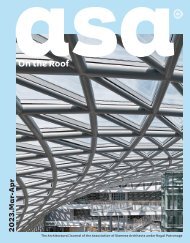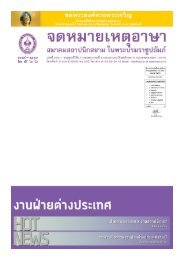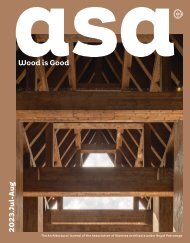บ้านเรือนถิ่นไทยในช่วงเจ็ดทศวรรษ 2489-2559
You also want an ePaper? Increase the reach of your titles
YUMPU automatically turns print PDFs into web optimized ePapers that Google loves.
ทางด้านสินค้าและบริการนั้นเพิ่มขึ้น 17 เท่า เมื่อเทียบ<br />
กับ ช่วง 50 ปีก่อนหน้านั้น พ.ศ. 2443-2493 ที่มีการ<br />
เติบโตของผลผลิตของประเทศต่ำกว่ากันถึง 3 เท่า และ<br />
เกือบจะต่ำกว่าอัตราการเพิ่มของจำนวนประชากรเสีย<br />
ด้วยซ้ำ<br />
คำถามสองข้อที่เกิดขึ้นจากประเด็นนี้คือ การเจริญ<br />
เติบโตแบบนี้เกิดขึ้นได้อย่างไร? และผลที่ตามมานั้น<br />
คืออะไร?<br />
เป็นคำถามที่ดูจะง่ายแต่มีคำตอบที่ซับซ้อน ลอง<br />
มาดูคำถามเรื่องสาเหตุก่อน มันคงจะผิดมากที่จะใช้<br />
สมการง่ายๆ แก้ไขปัญหาที่ซับซ้อนเช่นนี้ แล้วอะไรคือ<br />
ขอบเขตของความเป็นไปได้ที่เป็นประเด็นของเงื่อนไข<br />
ต่างๆ ที่สร้างแรงขับดันให้เกิดกระบวนการที่ทำให้<br />
สิ่งเหล่านี้เดินหน้าไปได้<br />
ยังจำช่วงเวลาที่เศรษฐกิจเติบโตในยุคหลังสงคราม<br />
ที่เริ่มต้นด้วยการปฏิรูปของ สฤษดิ์ ช่วงท้ายๆ ของ<br />
คริสต์ทศวรรษ 1950 (พ.ศ. 2493-2502) ได้ใช่ไหม<br />
สิ่งที่สำคัญที่สุดเพียงสิ่งเดียวของการปฏิรูปในครั้งนั้นคือ<br />
การสร้างเสถียรภาพทางเศรษฐกิจ ถ้าไม่มีความสำเร็จ<br />
ครั้งนั้นผู้ประกอบการไทยก็อาจจะไม่สามารถมาไกลได้<br />
ถึงเพียงนี้และจะไม่มีผลผลิตให้กับประเทศชาติได้เช่นนี้<br />
world was not standing still during this period. It is alleged<br />
that the Thai economy has only recently been caught up<br />
by the “globalization” of the world economy, and that is<br />
the explanation for the recent rapid expansion. But surely,<br />
Thailand had joined the world economy since it signed the<br />
Bowring Treaty in 1855, which limited the import duty on<br />
general merchandise to 3 per cent ad valorem, later 5<br />
percent. This remained in force until 1935, when fiscal<br />
autonomy was returned to Thailand. How much more<br />
open could an economy be? Yet, at one time, it was<br />
argued that it was precisely the inability to protect its<br />
industry which kept the Thai economy from industrializing<br />
and from growing.<br />
This is not to say that the rest of the world has had<br />
no impact on the Thai economy. The impact came largely<br />
through the technology that became accessible. Being<br />
backward in this area, Thai entrepreneurs could draw on<br />
considerable technology almost available “off the shelf”.<br />
Almost, but not quite. To acquire such technology itself<br />
requires skill on the part of Thai factory workers and<br />
90<br />
แต่ลองมาเจาะลึกและให้ความสำคัญต่อคำว่า<br />
เสถียรภาพทางเศรษฐกิจสักหน่อย เสถียรภาพทาง<br />
เศรษฐกิจเพียงอย่างเดียวไม่เพียงพอต่อการสร้างความ<br />
เจริญเติบโต ก่อนสงครามโลกครั้งที่สองประเทศไทยมี<br />
ความสุขกับเสถียรภาพทางเศรษฐกิจที่ไม่ได้เติบโต<br />
มากนัก จริงๆ ก็มีคนบางกลุ่มมองว่าวิธีการสร้าง<br />
เสถียรภาพทางเศรษฐกิจที่ดีนั้น คือ การสร้างความ<br />
เจริญเติบโต<br />
เสถียรภาพทางเศรษฐกิจในยุคหลังปฏิรูปของ<br />
สฤษดิ์นั้นขึ้นอยู่กับกระบวนการหนึ่งคือ การสะสมทุน<br />
และนื่คือการเปลี่ยนแปลงที่แท้จริง คือการรับเอาชนชั้น<br />
ผู้ประกอบการชาวจีนเข้ามารวมในสังคมไทย เป็น<br />
ความจริงที ่ว่าบุตรหลานชาวจีนที่อพยพนั้นเริ่มที่จะ<br />
กลืนไปกลายเป็นชาวไทยแล้ว แต่มันก็เป็นเพียงบาง<br />
ครอบครัวเท่านั้น เพื่อให้เห็นถึงประเด็นที่กล่าวคือ<br />
หลังจากที่พวกเขาสร้างเนื้อสร้างตัวด้วยการเป็นนาย<br />
อากรเก็บภาษี หรือนักการค้าที่ผูกขาดในสินต้าบาง<br />
ประเภทโดยทำงานให้กับราชสำนัก และเมื่อบุตรหลาน<br />
ของพวกเขาเริ่มเติบใหญ่ บุตรหลานชาวจีนเหล่านี้ก็ได้<br />
รับพระมหากรุณาธิคุณให้รับราชการ จึงเกิดการ<br />
ขยายตัวของการส่งออกข้าว การอพยพเข้ามาของชาว<br />
managers – and, lest it be forgotten, of Thai farmers<br />
using the tractors and threshers as well. Without<br />
investments made in schools and universities over this<br />
period, the acquisition of such technology would have<br />
been much more difficult. Despite the large investments<br />
made, they are proving insufficient for Thais to keep up<br />
with the pace of technology worldwide, and our ability to<br />
acquire and master new technology is a matter of serious<br />
concern.<br />
What then are the consequences of this enormous<br />
economic expansion? Two divergent answers are given,<br />
reminiscent of the dispute between those who see half<br />
a glass of water as half-full and those who see it as<br />
half-empty.<br />
Thais are on average five times richer than they were<br />
fifty years ago. Of course, this increase in the average<br />
hides a great deal of disparity in the gains to economic<br />
expansion, but it is mere sloganeering to say that, as<br />
a result of the growth, “the rich has gotten richer, and the<br />
poor poorer”. Economic growth has indeed trickled down


